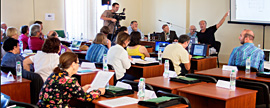|
THE 11th INTERNATIONAL SYMPOSIUM ON TRADITIONAL POLYPHONY 26– 30 September, 2022, Tbilisi, Georgia |
International Research Center for Traditional Polyphony of Vano Sarajishvili Tbilisi State Conservatoire and the International Centre for Georgian Folk Song are pleased to announce that the scholars working on the problems of polyphony are invited to participate in the 11th International Symposium on Traditional Polyphony, on 26–30 September, 2022, in Tbilisi, Georgia.
We hope that by this time the world will defeat the Covid-19 pandemic and we will be able to hold this important scientific forum in the usual format. In addition, our remote experience will allow us to further expand the participation of interested researchers in the symposium.
One of the features of the symposium is the diversity of themes, which is allowed by the interdisciplinary character of ethnomusicology.
Official languages of the Symposium are English and Georgian. All the papers will be published after the symposium in both English and Georgian.
Complete information including the history of previous symposia, information on the participants, contents of the bilingual books of proceedings with full texts of all symposium papers and about the International Research Center for Traditional Polyphony of Tbilisi State Conservatoire is provided at the Web Site: www.symposium.polyphony.ge
Topics of the Symposium:
The participants are encouraged to submit abstracts on all aspects of traditional polyphony. The submitted papers will be grouped according to the problems discussed in them and will be presented at the corresponding session. This will allow to better cover the wide range of issues of polyphony.
Along with traditional problems, we would like to present one new topic at the 11th symposium:
Audiovisual Ethnomusicology: Challenges and Perspectives: Audiovisual ethnomusicology is a fairly topical field, which is evidenced by the fact that a separate research group on audio musical ethnomusicology has been created at the International Council of Traditional Music. This direction implies active application of various types of audiovisual media in the presentation process of ethnomusicological research and material. On the one hand, all this aims to introduce documentation-presentation of the material along with the textual in ethnomusicology, and on the other hand, to increase accessibility of ethnomusicological works to the wide audience.
The other themes are:
1. General Theory, History, and Musical-Aesthetic Aspects of Polyphony
This topic considers wide range of general problems of polyphony, characteristic of contemporary cultural anthropology.
2. Regional Styles and Musical Language of Traditional Polyphony
This theme unites wide range of regional studies of the polyphonic singing styles of huge regions as well as in-depths studies of a small region, ethnic minority, or even a village.
3. Comparative Study of Traditional Polyphony
It is impossible to have a comprehensive understanding of the phenomenon of traditional polyphony without comparative approach. We suggest scholars to work on the development of new methodologies in this direction.
4. Sociological Aspects of Traditional Polyphony: Performers and Listeners; Gender, Age, Identity.
Wide range of topics on different aspects of traditional community’s social life is covered under this theme. These problems will be viewed in contemporary life and from the historical perspectives.
5. Polyphony in Secular and Sacred Music
This comprises interaction between traditional polyphony and early forms of professional polyphony in various European countries are the main topics of this theme, although the papers dedicated to other regions and time span are also welcome.
6. Traditional Instrumental Polyphony
Although central topic of the symposium is vocal polyphony, different aspects of the interaction of vocal and instrumental polyphony might be discussed under this theme
7. World Music and Traditional Polyphony
“World Music” expresses the aspiration of different cultures towards harmonization. The idea of “Global Village” testifies to the universal character of music. Interested people study traditional singing on the spot; traditional singers are invited to teach in other countries. What is lost or gained in this process?
Round table: “Folk Musical Tourism”
Folk music, especially polyphony, as a product of cultural tourism is in great demand on the world market today – more and more people are interested in folk music of other cultures, world music is actively included in the repertoire of professional and amateur groups. In addition, recent increase in migration has led to the formation of new diaspora communities, thanks to which traditional music has played an important role in the preservation of ethnic identity.
In recent years, the number of summer camps in the villages has also increased; here the guests are offered an environment as close to folklore as possible. Indeed, transformation of folklore into a product of cultural tourism changes it, but at the same time prolongs its life. This relatively new field of cultural tourism needs to be systematized and refined in terms of teaching and management.
The subject of the Round Table discussion will be modern challenges and benefits brought by folk musical tourism, seen from the perspective of tradition bearers, musicians, ethnomusicologists.
Proposals
The Program Committee encourages submission of individual, panel, poster and round-table proposals:
- Individual paper will be allotted up to 20 minutes followed by 10 minutes for questions and discussion;
- Panel presentation includes two or three papers, 20 minutes each, followed by 10 minute discussion;
- Poster presenters will be allotted 10 minutes for presentation in Power Point format and 5 minutes for discussion. Poster presenters are kindly requested to bring a prepared 80 cm wide x 100 cm tall poster to the symposium;
- About 2-hour-long Round table session includes not more than four presenters (10 minutes each). The audience is encouraged to participate in the discussion.
Abstracts, CVs and full papers
Abstracts and short CVs – both texts no more than 1800 characters (both should be inserted in the on-line registration form).
The full texts – maximum 7 pages, font New Times Roman, size 12, spacing 1.5.
On-line Registration
On-line registration (Name, Surname, Country, Organization, Position, Email, Title
of the article, Abstract and short Bio) is obligatory for the participation in the symposium.
TIMELINE
The deadline for on-line registration: 15 April, 2022
Notification of the Acceptance: 15 May , 2022
The deadline for submission of full text of papers with the consideration of the time for translation – 01 July, 2022.
Registration fee
For scholars – 80 USD
For student – 30 USD
Accommodation, transportation, cultural program
All the cost of accommodation, as well as cultural program will be borne by the Organizing Committee of the Symposium.
The Organizing Committee plans a day of cultural program for the Symposium participants. Cultural program includes sightseeing in one of Georgia’s regions.
The Tbilisi International Symposium is not only a scholarly discussion of the problems of folk multi-part singing, but is accompanied by a wide spectrum of polyphonic music from Georgia and elsewhere. We expect that, as always, a number of ensembles from around the world will present polyphonic singing at the symposium.
Program Committee
Dr. Rusudan Tsurtsumia (Georgia)
Dr. Joseph Jordania (Australia/Georgia)
Dr. Izaly Zemtsovsky (USA/Russia)
Dr. Tamaz Gabisonia (Georgia)
Dr. Nino Tsitsishvili (Australia/Georgia)
Dr. Daiva Rachiunaite-Vichiniene (Lithuania)
WEATHER IN GEORGIA
Georgia has mild climate, similar to Mediterranean countries. Temperature at the end of October and beginning of November ranges between +15C to +25C.
ST-SYMPOSIUM TRIP TO GEORGIAN REGIONS
During past several symposia a new informal tradition had been established.
A group of foreign singers of Georgian songs, together with scholars from various countries, visit rural regions of Georgia. They live in the families of traditional singers for several days, learn traditional polyphonic songs from them and visit the sights and historical monuments. In 2022 Apart from Svaneti and Samegrelo, we will visit Achara as well.
If you have time and are interested to take part in one of these trips, please let us know (better in advance, but you can finalize your plans in the final months before the symposium as well). We usually have 25–35 participants.
DATES: The post-symposium trip will start on October 1 till October 12. The group will leave Tbilisi City Centre at 9.00 am. Participants with time constrains can join the trip later, or leave earlier.
FEES: The fee for the trip is easy to work out – each day of the trip costs the participants 80 USD per person. So if you are joining the trip only for four days, you will pay 320 USD, 12 days – 960 USD, etc. The fee fully covers everything: transportation (from Tbilisi to Tbilisi), accommodation (with toilets and showers), food, all workshops with traditional singers, visits to glaciers and museums.
WHAT TO TAKE: Hiking boots and warm cloths. In Svaneti we expect snow and mild freezing temperatures.
WHO TO CONTACT:
If you are interested to join the post-symposium trip to three Georgian regions, contact Tina Nadareishvili (Info@villagelife.travel).
Contact Information for Symposium Participants
Prof. Rusudan Tsurtsumia, E-mail: polyphony@tsc.edu.ge
Dr. Joseph Jordania, E-mail: josephjordania@yahoo.com.au





